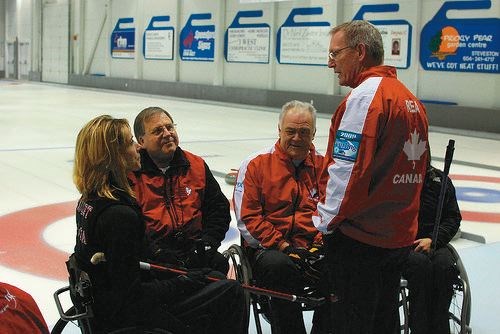As a player, Joe Rea has always wanted to wear a Team Canada jacket. In 37 years of curling, he hasn't yet achieved his goal.
As a coach, well, that's a different story.
Rea is about to attend his second Paralympic Winter Games as head coach of Canada's wheelchair curling team. Canada enters the Games, March 12-21 in Vancouver and Whistler, as the defending champion. Rea was also head coach when Team Canada won gold in Torino, Italy, in 2006.
Being in Torino for those Games was an absolute thrill for Rea. But, he's even more excited about his upcoming stay in Vancouver.
"To have this opportunity to go to a Paralympics in your own country and represent your country is the biggest honour I'll ever have," said the 51-year-old Rea, who was born in Vancouver but has lived in Prince George since childhood. "We just want to go and do our best. I'm not going to say we're going to win this thing but we're going to give it our best shot. We just want to make people proud of us and we've got a great team to do that.
"When they raise your flag at the end and sing the national anthem after you've finished your event, I defy you to keep your eyes clear," Rea added. "You're so proud when that happens."
Rea first got involved in coaching the wheelchair game in 2003 right here in Prince George. He later worked at the provincial level and joined the national team program in 2005. After Torino, he led Canada to fourth-place finishes in the world championships in 2007 and 2008. Last February in Richmond, Rea's Canadian crew was golden at the worlds.
That team -- with Jim Armstrong at skip, Darryl Neighbour at third, Sonja Gaudet at second and Ina Forrest at lead -- is the same one that will throw for gold at the Vancouver Paralympics. Armstrong and Neighbour live in Richmond, while Gaudet and Forrest both reside in Vernon. The team's alternate, Bruno Yizek, makes his home in Calgary.
During the Games, Rea's wife, Colleen, will be in attendance on the opening and final weekends. The players, meanwhile, will all have family members there to support them as well.
This season, in preparation for the Paralympics, Rea and company have already competed in three international events in Europe and one in Vancouver. They finished second in Norway in October and first in Scotland later that month. In November, in the Czech Republic, they placed third. And, in Vancouver in December, they topped the field.
In wheelchair curling, the quality of play has risen dramatically in the past few seasons. So, at the Paralympics, Team Canada will have to be at its best to contend for gold.
"Norway has been the world champ in 2007 and 2008 so they'll be in the thick of it," said Rea, who works as a project coordinator for Canfor. "I know they're not showing up to be second place. We've played Korea a few times in Vancouver and they're a tough team, those guys. They're younger guys and they play pretty well. I don't think there is any team you can underestimate out there. I don't think you would want to let your guard down on anybody because they seem to show up to play when they play us."
Wheelchair curling does have its differences from the able-bodied variety. Most notably, there's no sweeping, which, in traditional curling, allows teams to exert some control on the path the rock takes and the distance it travels.
"In this game, it's more like darts -- you stand up at the line and you throw," said Rea, who added that the Team Canada players are normally 70 to 75 per cent effective when it comes to making their intended shots.
Another difference between regular curling and wheelchair curling is the length of the games -- 10 ends in one and just eight in the other.
During games, Rea monitors the proceedings and readies himself to dispense advice at the fourth-end break. Much of his work, however, is done long before he and the players ever get to the rink.
"We have pre-game planning meetings -- how we're going to play and strategies we'll use," he said. "It's not that much different than a hockey coach other than you can't kind of yell in midstream."
The Paralympic curling venue is located in downtown Vancouver, next to Nat Bailey Stadium. Team Canada will play its first round-robin games March 13 against Great Britain and the United States. Other countries represented are Norway, Korea, Sweden, Switzerland, Italy, Germany and Japan.
The top four teams will advance to the playoffs. Medal games are scheduled for March 20.



